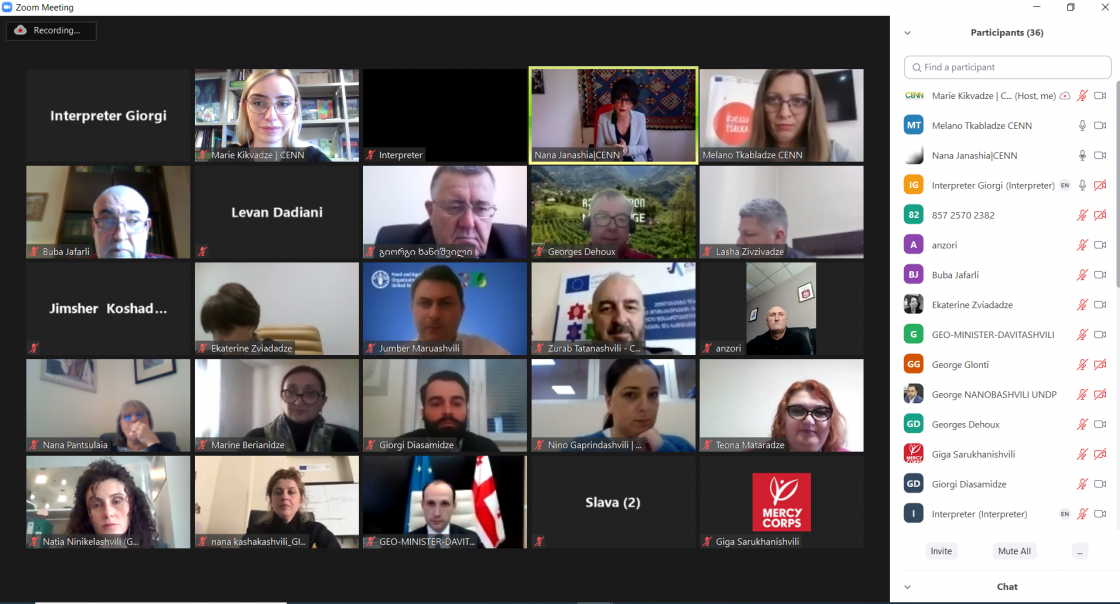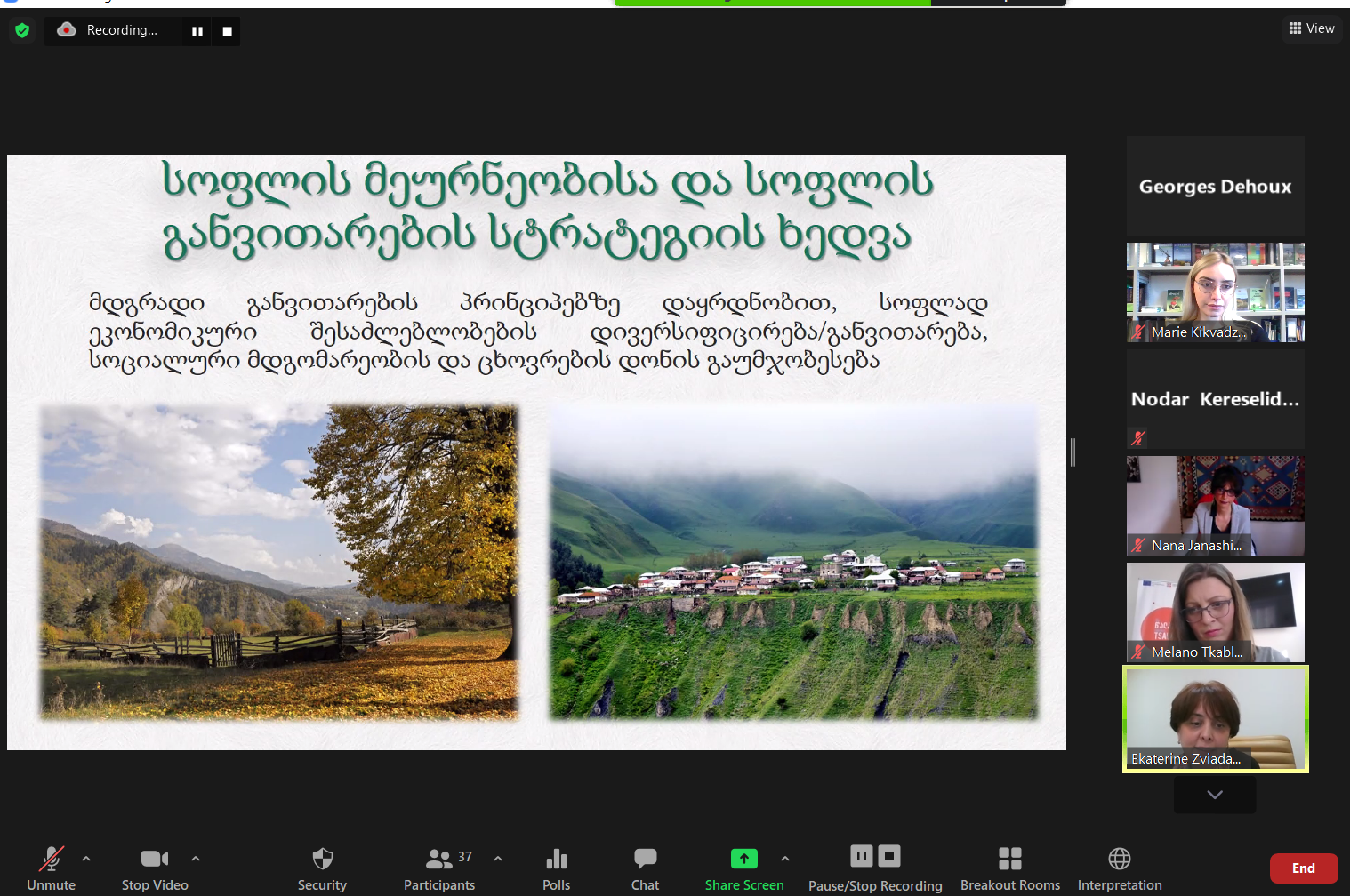CENN Hosted the Second Steering Committee Meeting Online Under the EU ENPARD Supported “EMBRACE Tsalka” Project
11.February.2021
February 9, 2021. ZOOM – CENN hosted the second Steering Committee meeting established within the framework of the EU ENPARD program supported project “EMBRACE Tsalka” via the online ZOOM platform. The event was attended by representatives of the EU ENPARD program, the Ministry of Environment and Agriculture of Georgia, Tsalka Municipality City hall and ENPARD partner organizations. The purpose of the meeting was to get acquainted with the activities implemented and planned within the project, to discuss existing challenges, exchange information and recommendations, and discuss future cooperation perspectives.
The event was opened by CENN’s executive director, Nana Janashia. In the opening part of the meeting, the Minister of Environment Protection and Agriculture of Georgia, Levan Davitashvili, spoke about the role of EU assistance and the importance of the project “EMBRACE Tsalka”. The bottom-up approach and ENPARD IV were discussed by the EU Delegation to Georgia – Agriculture, Fisheries and Food Safety Program Officer and Attaché, George Dehoux.
“I am glad that we were given the opportunity to meet and exchange information again in this new format. The main purpose of our meeting is to share with you the experiences and challenges gained within the project ‘EMBRACE Tsalka’ and to hear your advice and practices. Representatives of the EU Delegation to Georgia, the Minister of Environment of Georgia, the Deputy Mayor of Tsalka Municipality and our partners are present at the event today. Thank you for attending our event, because your involvement and participation is very important to us. Also, thank you to the EU Delegation to Georgia for both political and financial assistance, as your assistance is very important for better development for both Tsalka and the country itself. The Tsalka project, unlike previous ENPARD projects, focuses on the fourth area in addition to the three existing ones, which involves the integration and empowerment of vulnerable groups. I believe that working in this direction will make the project even more sustainable in the long run, because integration is one of the most important challenges for Tsalka Municipality,” noted Nana Janashia, CENN’s Executive Director.
“Tsalka is a very important municipality close to Tbilisi, but unfortunately, it is less integrated in the Georgian reality and daily life. Tsalka is not discovered, not only by the Georgian population, but also by the people of Tsalka, and it is very important that your project branding ‘EMBRACE Tsalka’, focuses directly on the municipality and its awareness, because one of the areas that can bring economic prosperity to the municipality should be tourism, especially at a time when the municipality has a really great tourism potential, due to its beautiful nature and location. When we talk about rural development, we often see other economic activities besides agriculture, and local initiatives supported by the European Union and the ‘EMBRACE Tsalka’ project, be it cattle breeding, entrepreneurship or tourism, are very important for local economic growth and development. The EU practice in strengthening LAGs has shown great success and it is a priority for us to concentrate on strengthening LAGs in the ENPAD IV phase,” stated Levan Davitashvili, Minister of Environment and Agriculture of Georgia.
“The LAG and LEADER approach is something typical to the EU, but also very relevant for Georgia. What we see here is that each of you has a very different context and reason to exist and one of the most important messages is that even though it is the EU program and the EU concept, it is extremely important that you make it your own. That is to be done at two levels. One that we are constantly discussing with the ministry is in terms of national policy policy development. The other is at each municipal and local level, where the concept is the same but the way you adopt it is different. This is where these kinds of meetings are extremely useful as you are able to exchange on your respective practices and discuss different approaches with our colleagues, partners, beneficiaries and governing bodies,” noted Georges Dehoux, Attaché, Programme Officer Agriculture, Fisheries & Food Safety, Delegation of the European Union to Georgia.
Within the meeting, the Tsalka Local Action Group (LAG) Co-Chair and Project Manager introduced presentations and talked about the project progress and challenges. Time was also given to the presentation of the climate change assessment created within the project.
“We are pleased that our important strategic partner, the European Union, is providing us with great financial and political support at the local level as well, enabling us to implement modern, European approaches and establish exemplary practices of cooperation between the state and non-governmental sectors. From the start of the project, we have expressed a desire to establish good practices in working with the project and the LAG, and we are pleased that the willingness to collaborate is great on both sides. This is proven by the Memorandum of Understanding between the City Hall, LAG and CENN signed in July 2020. The activities of the EU and Tsalka LAG are really aimed at creating a better and more sustainable future. We welcome the existence of the LAG and declare our readiness to cooperate with this group, and this year we have already identified up to 10 issues of joint cooperation and will do our best to be responsible within City Hall,” said Jambul Khozhrevanidze, the deputy mayor of Tsalka Municipality.
During the meeting, a panel discussion was held during which the participants were introduced to the planned activities by Nodar Kereselidze, UNDP National Project Manager in Georgia, and Juba Maruashvili, National Food and Agriculture Organization (FAO) ENPARD Grant Management Expert.
At the end of the meeting, the participants agreed on the implementation of activities in cooperation with the current projects and the availability of opportunities.
The project “EMBRACE Tsalka” is implemented under the European Neighbourhood Programme for Agriculture and Rural Development (ENPARD) by the EU’s partner organization CENN, in partnership with the Georgian Farmers’ Association (GFA) and German partner organization – Institute for Rural Development Research (IfLS). The project aims at diversifying local economic activities, improving the investment climate, and empowering competitive agricultural and environmental practices in Keda Municipality via bottom-up strategic planning of rural development.
The EU is supporting agriculture and rural development in Georgia through its ENPARD Programme. Implemented since 2013 with a total budget of EUR 179.5 million, the main goal of ENPARD is to reduce rural poverty in Georgia. The first phase of ENPARD in Georgia focused on developing the potential of agriculture. The second and third phases of ENPARD focus on creating economic opportunities for rural population that go beyond agricultural activities. More information on ENPARD is available at: www.enpard.ge.
Media Contacts:
- Marie Kikvadze, CENN Communications Manager, +995 577 95 90 20, marie.kikvadze@cenn.org










